Reflective Journal on ISE 5600: Organizational Learning Insights
VerifiedAdded on 2020/04/15
|13
|2967
|42
Journal and Reflective Writing
AI Summary
This reflective journal provides an in-depth analysis of the ISE 5600 course, focusing on organizational learning. The journal covers lessons five through seven, exploring topics such as types of organizational learning, including non-traditional management approaches, and the concepts of organizational forgetting and unlearning. It also delves into building learning organizations, examining the integration of various topics and the importance of mental models, inquiry processes, and thinking methods. Additionally, the journal reflects on workshops, specifically match games and knowledge cafes, highlighting their impact on understanding mental models and teamwork. The author discusses their evolving perspective on the course, emphasizing the practical applications of the concepts learned, and the importance of teamwork and continuous learning in a professional setting. The journal also references key theories, models, and real-world examples to support the reflections, including the small private online course (SPOC) platform and the problem-solving method by Xerox.

Reflective Journal
Student’s Name
Institution’s Name
Student’s Name
Institution’s Name
Paraphrase This Document
Need a fresh take? Get an instant paraphrase of this document with our AI Paraphraser
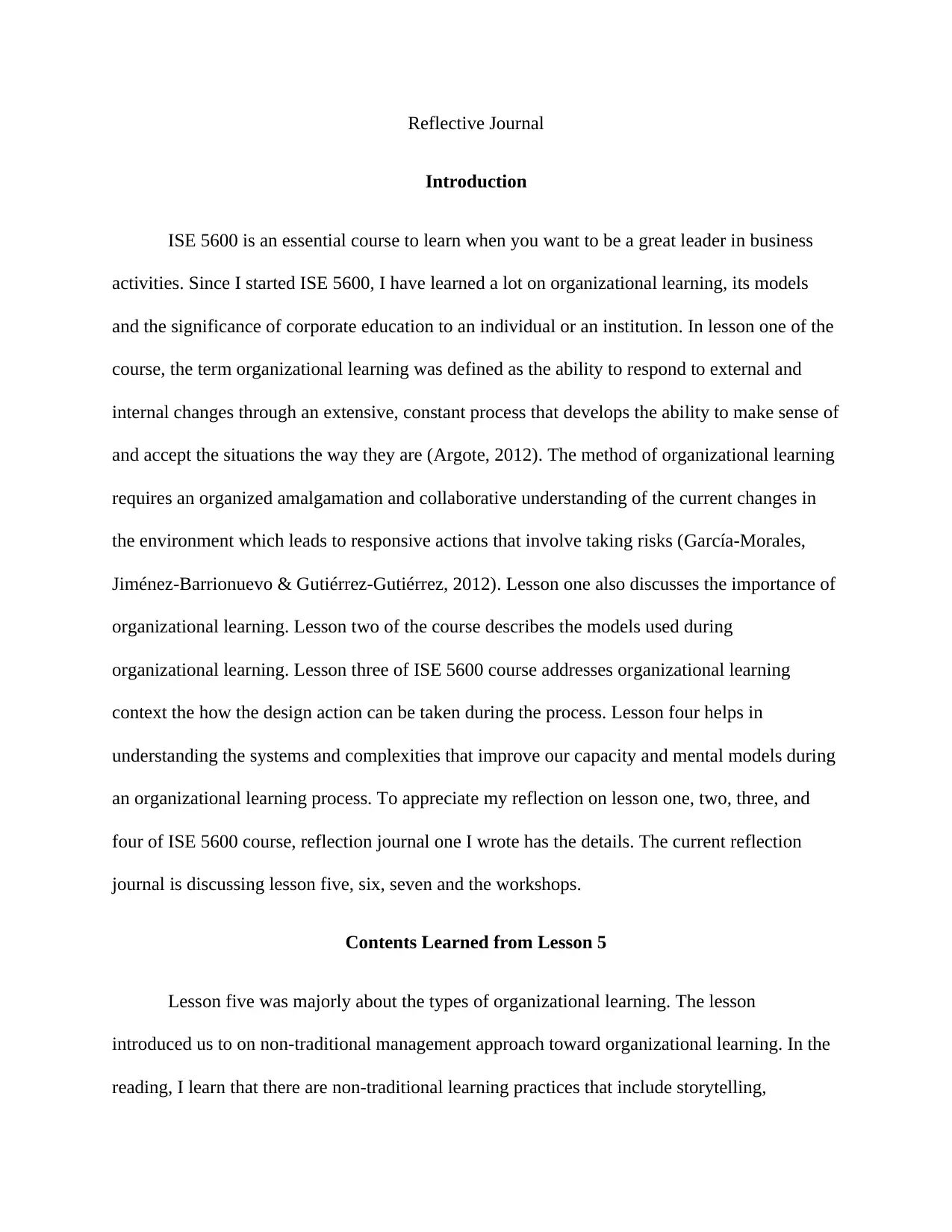
Reflective Journal
Introduction
ISE 5600 is an essential course to learn when you want to be a great leader in business
activities. Since I started ISE 5600, I have learned a lot on organizational learning, its models
and the significance of corporate education to an individual or an institution. In lesson one of the
course, the term organizational learning was defined as the ability to respond to external and
internal changes through an extensive, constant process that develops the ability to make sense of
and accept the situations the way they are (Argote, 2012). The method of organizational learning
requires an organized amalgamation and collaborative understanding of the current changes in
the environment which leads to responsive actions that involve taking risks (García-Morales,
Jiménez-Barrionuevo & Gutiérrez-Gutiérrez, 2012). Lesson one also discusses the importance of
organizational learning. Lesson two of the course describes the models used during
organizational learning. Lesson three of ISE 5600 course addresses organizational learning
context the how the design action can be taken during the process. Lesson four helps in
understanding the systems and complexities that improve our capacity and mental models during
an organizational learning process. To appreciate my reflection on lesson one, two, three, and
four of ISE 5600 course, reflection journal one I wrote has the details. The current reflection
journal is discussing lesson five, six, seven and the workshops.
Contents Learned from Lesson 5
Lesson five was majorly about the types of organizational learning. The lesson
introduced us to on non-traditional management approach toward organizational learning. In the
reading, I learn that there are non-traditional learning practices that include storytelling,
Introduction
ISE 5600 is an essential course to learn when you want to be a great leader in business
activities. Since I started ISE 5600, I have learned a lot on organizational learning, its models
and the significance of corporate education to an individual or an institution. In lesson one of the
course, the term organizational learning was defined as the ability to respond to external and
internal changes through an extensive, constant process that develops the ability to make sense of
and accept the situations the way they are (Argote, 2012). The method of organizational learning
requires an organized amalgamation and collaborative understanding of the current changes in
the environment which leads to responsive actions that involve taking risks (García-Morales,
Jiménez-Barrionuevo & Gutiérrez-Gutiérrez, 2012). Lesson one also discusses the importance of
organizational learning. Lesson two of the course describes the models used during
organizational learning. Lesson three of ISE 5600 course addresses organizational learning
context the how the design action can be taken during the process. Lesson four helps in
understanding the systems and complexities that improve our capacity and mental models during
an organizational learning process. To appreciate my reflection on lesson one, two, three, and
four of ISE 5600 course, reflection journal one I wrote has the details. The current reflection
journal is discussing lesson five, six, seven and the workshops.
Contents Learned from Lesson 5
Lesson five was majorly about the types of organizational learning. The lesson
introduced us to on non-traditional management approach toward organizational learning. In the
reading, I learn that there are non-traditional learning practices that include storytelling,
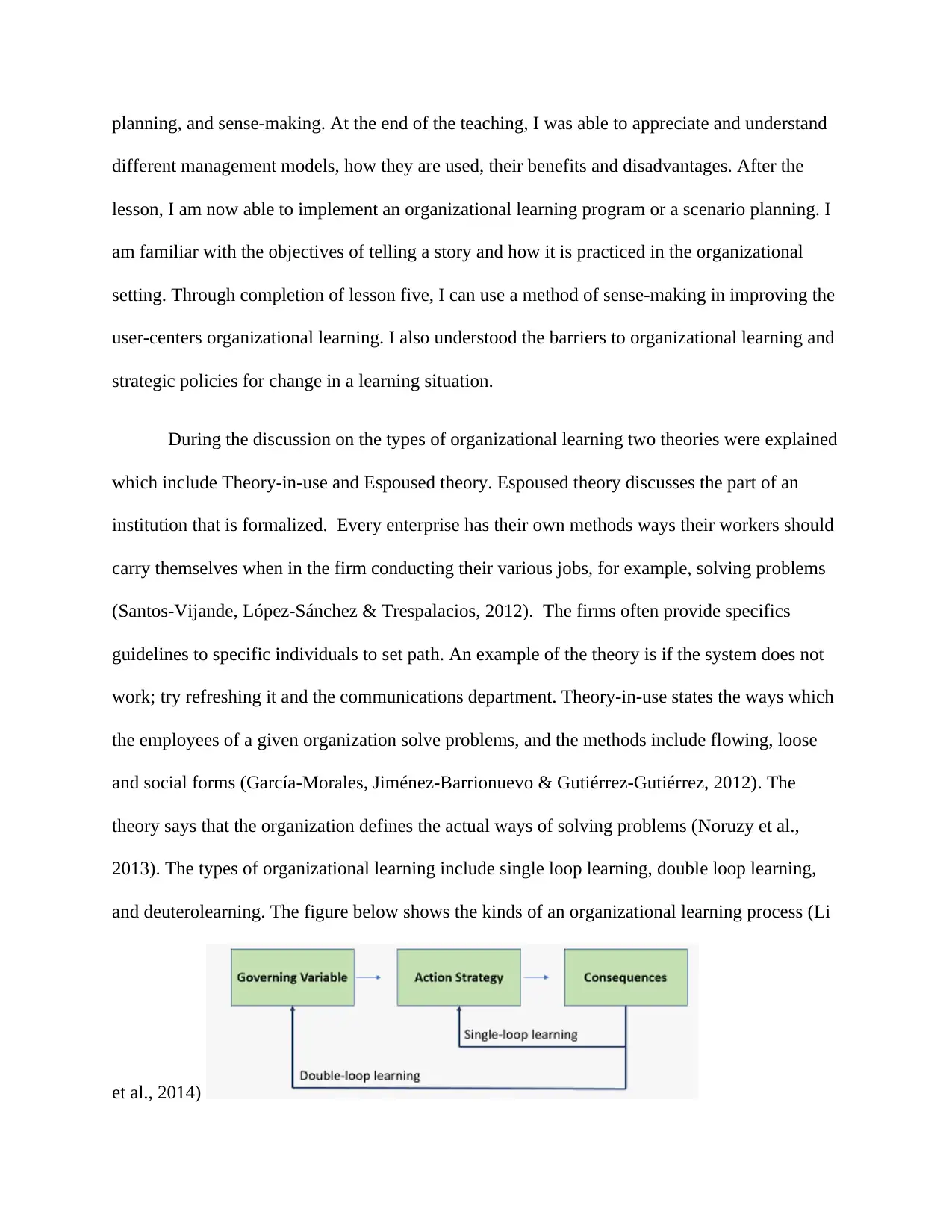
planning, and sense-making. At the end of the teaching, I was able to appreciate and understand
different management models, how they are used, their benefits and disadvantages. After the
lesson, I am now able to implement an organizational learning program or a scenario planning. I
am familiar with the objectives of telling a story and how it is practiced in the organizational
setting. Through completion of lesson five, I can use a method of sense-making in improving the
user-centers organizational learning. I also understood the barriers to organizational learning and
strategic policies for change in a learning situation.
During the discussion on the types of organizational learning two theories were explained
which include Theory-in-use and Espoused theory. Espoused theory discusses the part of an
institution that is formalized. Every enterprise has their own methods ways their workers should
carry themselves when in the firm conducting their various jobs, for example, solving problems
(Santos-Vijande, López-Sánchez & Trespalacios, 2012). The firms often provide specifics
guidelines to specific individuals to set path. An example of the theory is if the system does not
work; try refreshing it and the communications department. Theory-in-use states the ways which
the employees of a given organization solve problems, and the methods include flowing, loose
and social forms (García-Morales, Jiménez-Barrionuevo & Gutiérrez-Gutiérrez, 2012). The
theory says that the organization defines the actual ways of solving problems (Noruzy et al.,
2013). The types of organizational learning include single loop learning, double loop learning,
and deuterolearning. The figure below shows the kinds of an organizational learning process (Li
et al., 2014)
different management models, how they are used, their benefits and disadvantages. After the
lesson, I am now able to implement an organizational learning program or a scenario planning. I
am familiar with the objectives of telling a story and how it is practiced in the organizational
setting. Through completion of lesson five, I can use a method of sense-making in improving the
user-centers organizational learning. I also understood the barriers to organizational learning and
strategic policies for change in a learning situation.
During the discussion on the types of organizational learning two theories were explained
which include Theory-in-use and Espoused theory. Espoused theory discusses the part of an
institution that is formalized. Every enterprise has their own methods ways their workers should
carry themselves when in the firm conducting their various jobs, for example, solving problems
(Santos-Vijande, López-Sánchez & Trespalacios, 2012). The firms often provide specifics
guidelines to specific individuals to set path. An example of the theory is if the system does not
work; try refreshing it and the communications department. Theory-in-use states the ways which
the employees of a given organization solve problems, and the methods include flowing, loose
and social forms (García-Morales, Jiménez-Barrionuevo & Gutiérrez-Gutiérrez, 2012). The
theory says that the organization defines the actual ways of solving problems (Noruzy et al.,
2013). The types of organizational learning include single loop learning, double loop learning,
and deuterolearning. The figure below shows the kinds of an organizational learning process (Li
et al., 2014)
⊘ This is a preview!⊘
Do you want full access?
Subscribe today to unlock all pages.

Trusted by 1+ million students worldwide
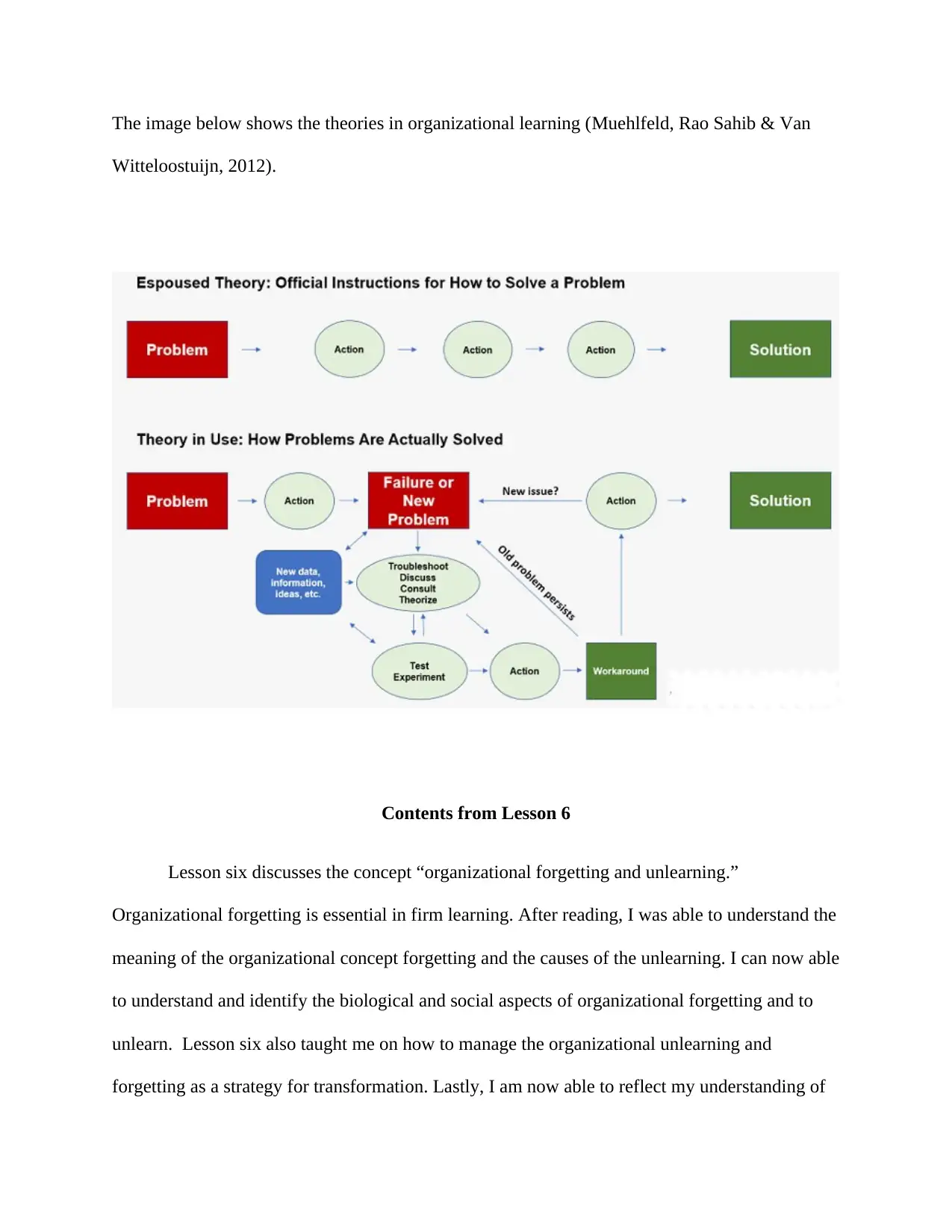
The image below shows the theories in organizational learning (Muehlfeld, Rao Sahib & Van
Witteloostuijn, 2012).
Contents from Lesson 6
Lesson six discusses the concept “organizational forgetting and unlearning.”
Organizational forgetting is essential in firm learning. After reading, I was able to understand the
meaning of the organizational concept forgetting and the causes of the unlearning. I can now able
to understand and identify the biological and social aspects of organizational forgetting and to
unlearn. Lesson six also taught me on how to manage the organizational unlearning and
forgetting as a strategy for transformation. Lastly, I am now able to reflect my understanding of
Witteloostuijn, 2012).
Contents from Lesson 6
Lesson six discusses the concept “organizational forgetting and unlearning.”
Organizational forgetting is essential in firm learning. After reading, I was able to understand the
meaning of the organizational concept forgetting and the causes of the unlearning. I can now able
to understand and identify the biological and social aspects of organizational forgetting and to
unlearn. Lesson six also taught me on how to manage the organizational unlearning and
forgetting as a strategy for transformation. Lastly, I am now able to reflect my understanding of
Paraphrase This Document
Need a fresh take? Get an instant paraphrase of this document with our AI Paraphraser
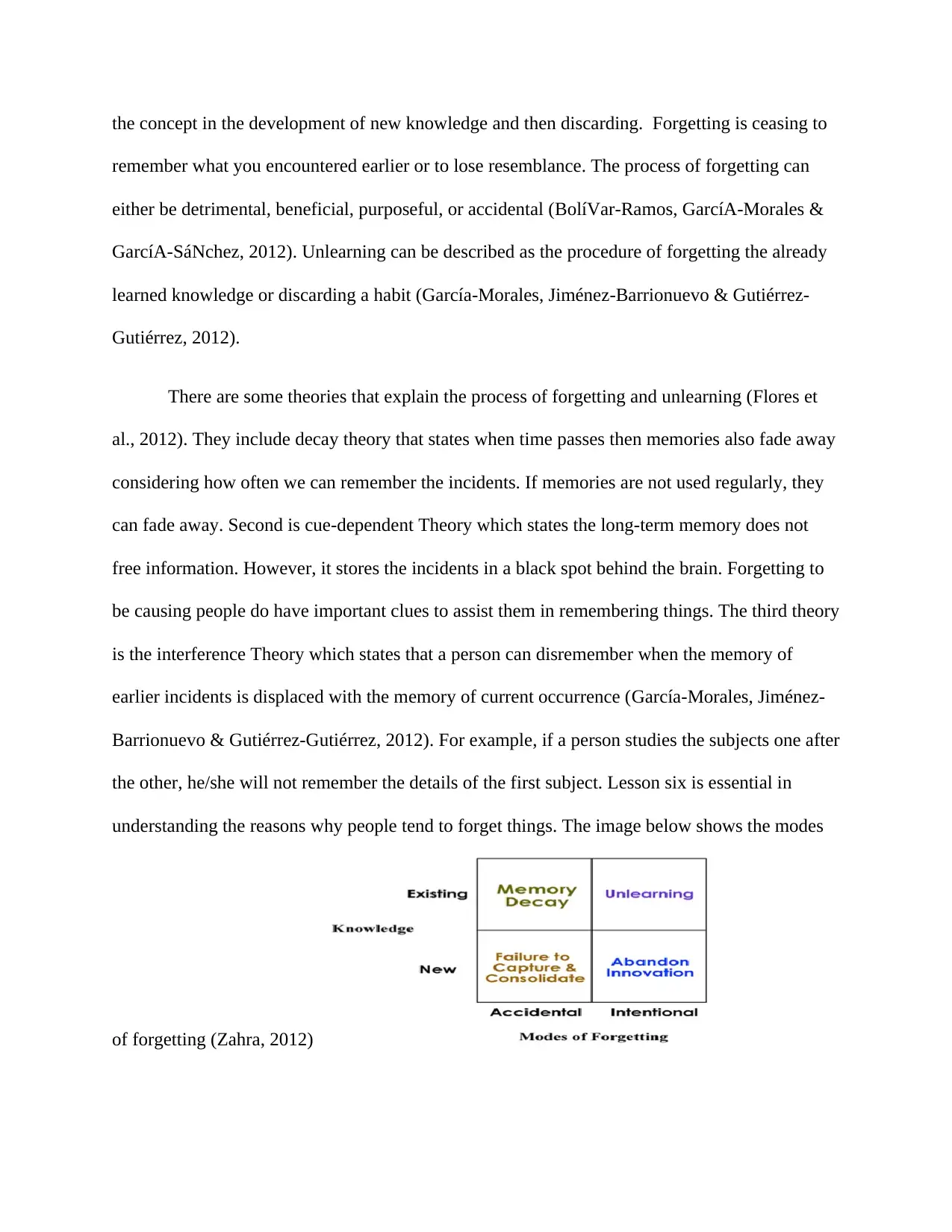
the concept in the development of new knowledge and then discarding. Forgetting is ceasing to
remember what you encountered earlier or to lose resemblance. The process of forgetting can
either be detrimental, beneficial, purposeful, or accidental (BolíVar-Ramos, GarcíA-Morales &
GarcíA-SáNchez, 2012). Unlearning can be described as the procedure of forgetting the already
learned knowledge or discarding a habit (García-Morales, Jiménez-Barrionuevo & Gutiérrez-
Gutiérrez, 2012).
There are some theories that explain the process of forgetting and unlearning (Flores et
al., 2012). They include decay theory that states when time passes then memories also fade away
considering how often we can remember the incidents. If memories are not used regularly, they
can fade away. Second is cue-dependent Theory which states the long-term memory does not
free information. However, it stores the incidents in a black spot behind the brain. Forgetting to
be causing people do have important clues to assist them in remembering things. The third theory
is the interference Theory which states that a person can disremember when the memory of
earlier incidents is displaced with the memory of current occurrence (García-Morales, Jiménez-
Barrionuevo & Gutiérrez-Gutiérrez, 2012). For example, if a person studies the subjects one after
the other, he/she will not remember the details of the first subject. Lesson six is essential in
understanding the reasons why people tend to forget things. The image below shows the modes
of forgetting (Zahra, 2012)
remember what you encountered earlier or to lose resemblance. The process of forgetting can
either be detrimental, beneficial, purposeful, or accidental (BolíVar-Ramos, GarcíA-Morales &
GarcíA-SáNchez, 2012). Unlearning can be described as the procedure of forgetting the already
learned knowledge or discarding a habit (García-Morales, Jiménez-Barrionuevo & Gutiérrez-
Gutiérrez, 2012).
There are some theories that explain the process of forgetting and unlearning (Flores et
al., 2012). They include decay theory that states when time passes then memories also fade away
considering how often we can remember the incidents. If memories are not used regularly, they
can fade away. Second is cue-dependent Theory which states the long-term memory does not
free information. However, it stores the incidents in a black spot behind the brain. Forgetting to
be causing people do have important clues to assist them in remembering things. The third theory
is the interference Theory which states that a person can disremember when the memory of
earlier incidents is displaced with the memory of current occurrence (García-Morales, Jiménez-
Barrionuevo & Gutiérrez-Gutiérrez, 2012). For example, if a person studies the subjects one after
the other, he/she will not remember the details of the first subject. Lesson six is essential in
understanding the reasons why people tend to forget things. The image below shows the modes
of forgetting (Zahra, 2012)
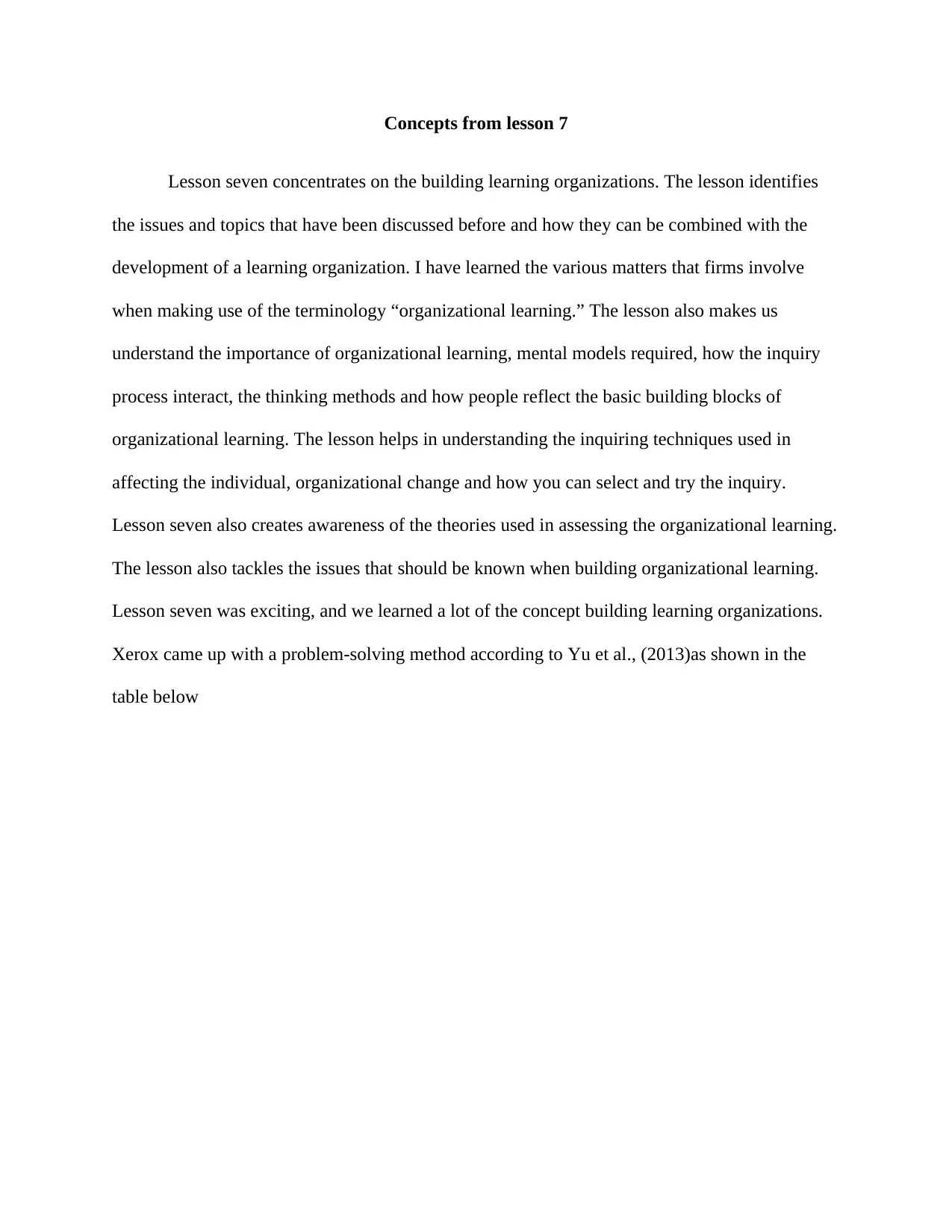
Concepts from lesson 7
Lesson seven concentrates on the building learning organizations. The lesson identifies
the issues and topics that have been discussed before and how they can be combined with the
development of a learning organization. I have learned the various matters that firms involve
when making use of the terminology “organizational learning.” The lesson also makes us
understand the importance of organizational learning, mental models required, how the inquiry
process interact, the thinking methods and how people reflect the basic building blocks of
organizational learning. The lesson helps in understanding the inquiring techniques used in
affecting the individual, organizational change and how you can select and try the inquiry.
Lesson seven also creates awareness of the theories used in assessing the organizational learning.
The lesson also tackles the issues that should be known when building organizational learning.
Lesson seven was exciting, and we learned a lot of the concept building learning organizations.
Xerox came up with a problem-solving method according to Yu et al., (2013)as shown in the
table below
Lesson seven concentrates on the building learning organizations. The lesson identifies
the issues and topics that have been discussed before and how they can be combined with the
development of a learning organization. I have learned the various matters that firms involve
when making use of the terminology “organizational learning.” The lesson also makes us
understand the importance of organizational learning, mental models required, how the inquiry
process interact, the thinking methods and how people reflect the basic building blocks of
organizational learning. The lesson helps in understanding the inquiring techniques used in
affecting the individual, organizational change and how you can select and try the inquiry.
Lesson seven also creates awareness of the theories used in assessing the organizational learning.
The lesson also tackles the issues that should be known when building organizational learning.
Lesson seven was exciting, and we learned a lot of the concept building learning organizations.
Xerox came up with a problem-solving method according to Yu et al., (2013)as shown in the
table below
⊘ This is a preview!⊘
Do you want full access?
Subscribe today to unlock all pages.

Trusted by 1+ million students worldwide
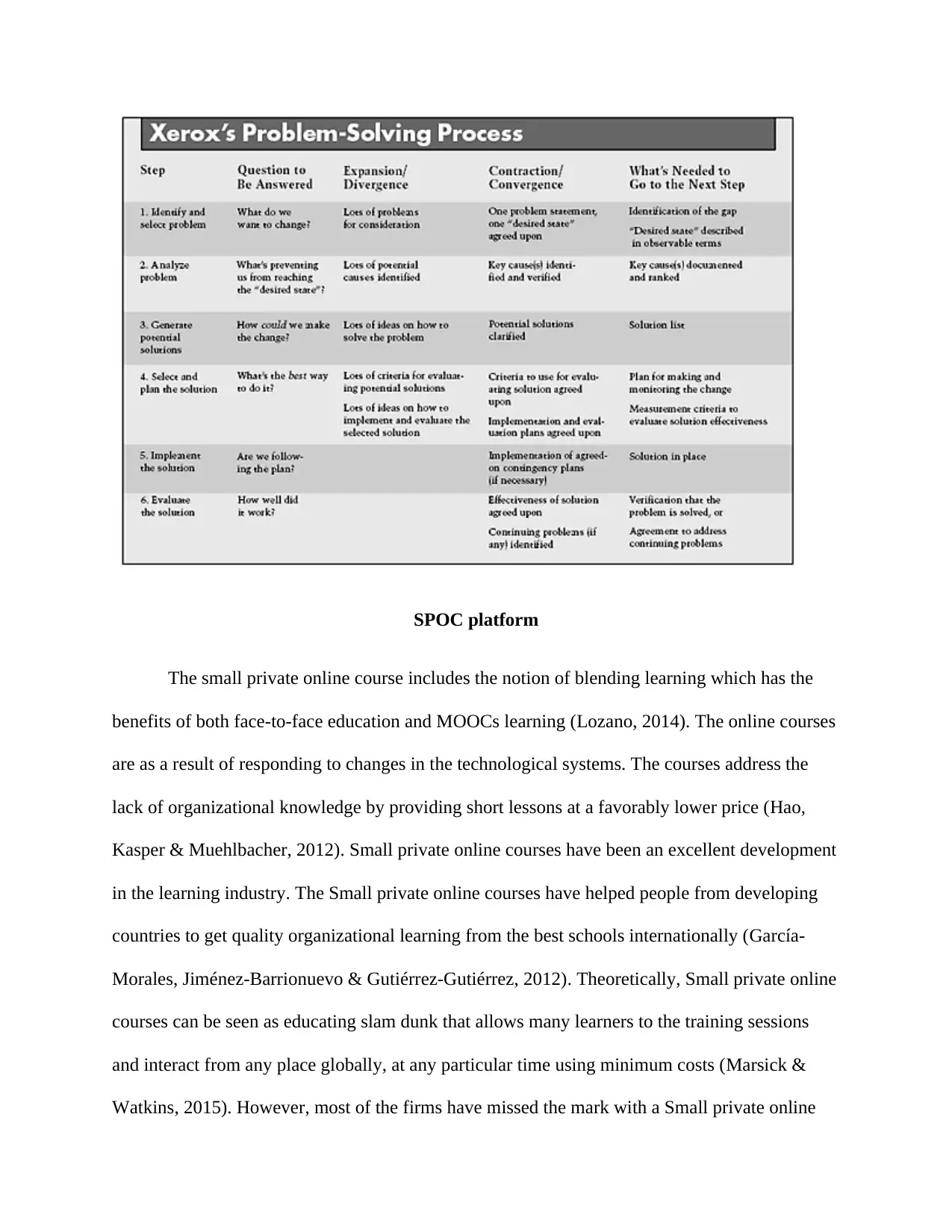
SPOC platform
The small private online course includes the notion of blending learning which has the
benefits of both face-to-face education and MOOCs learning (Lozano, 2014). The online courses
are as a result of responding to changes in the technological systems. The courses address the
lack of organizational knowledge by providing short lessons at a favorably lower price (Hao,
Kasper & Muehlbacher, 2012). Small private online courses have been an excellent development
in the learning industry. The Small private online courses have helped people from developing
countries to get quality organizational learning from the best schools internationally (García-
Morales, Jiménez-Barrionuevo & Gutiérrez-Gutiérrez, 2012). Theoretically, Small private online
courses can be seen as educating slam dunk that allows many learners to the training sessions
and interact from any place globally, at any particular time using minimum costs (Marsick &
Watkins, 2015). However, most of the firms have missed the mark with a Small private online
The small private online course includes the notion of blending learning which has the
benefits of both face-to-face education and MOOCs learning (Lozano, 2014). The online courses
are as a result of responding to changes in the technological systems. The courses address the
lack of organizational knowledge by providing short lessons at a favorably lower price (Hao,
Kasper & Muehlbacher, 2012). Small private online courses have been an excellent development
in the learning industry. The Small private online courses have helped people from developing
countries to get quality organizational learning from the best schools internationally (García-
Morales, Jiménez-Barrionuevo & Gutiérrez-Gutiérrez, 2012). Theoretically, Small private online
courses can be seen as educating slam dunk that allows many learners to the training sessions
and interact from any place globally, at any particular time using minimum costs (Marsick &
Watkins, 2015). However, most of the firms have missed the mark with a Small private online
Paraphrase This Document
Need a fresh take? Get an instant paraphrase of this document with our AI Paraphraser
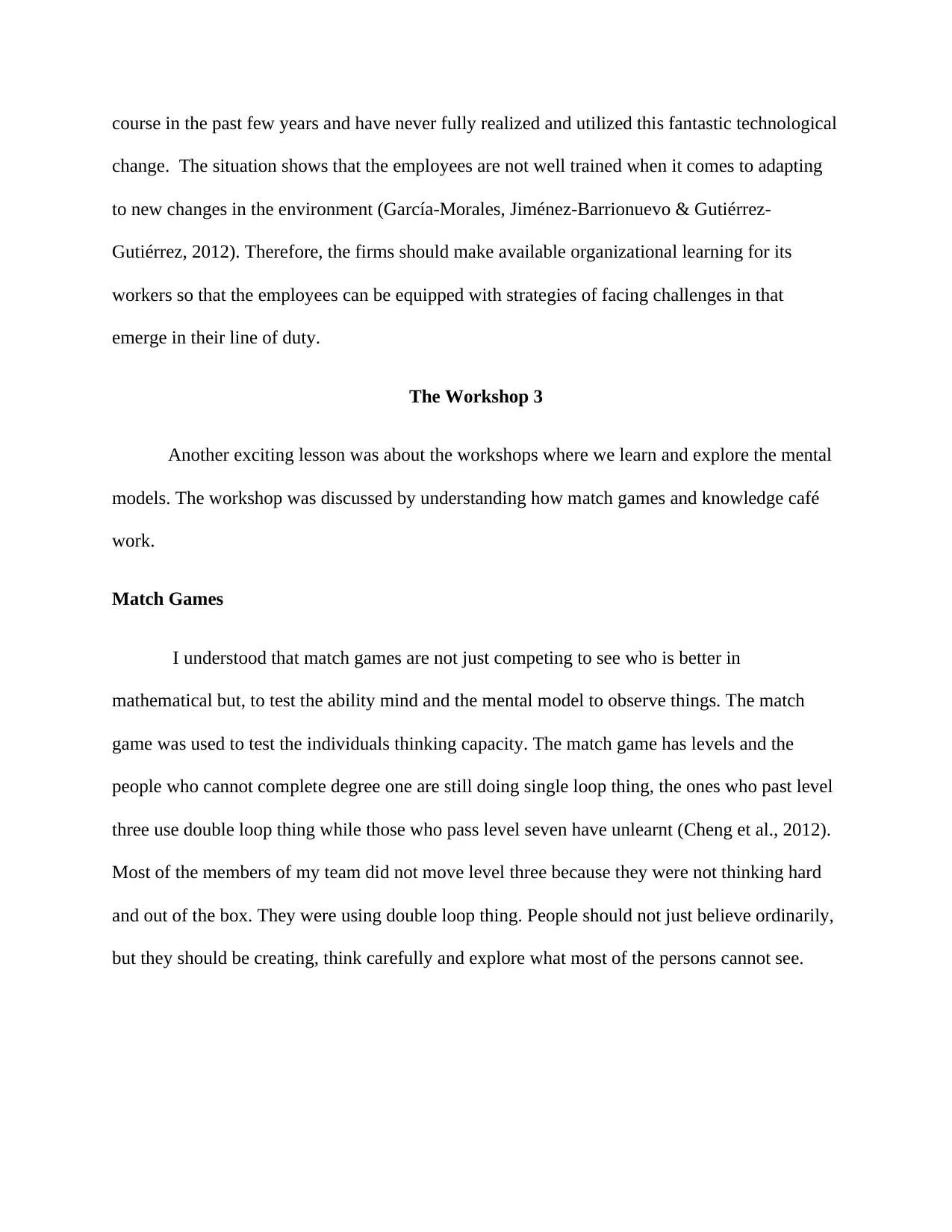
course in the past few years and have never fully realized and utilized this fantastic technological
change. The situation shows that the employees are not well trained when it comes to adapting
to new changes in the environment (García-Morales, Jiménez-Barrionuevo & Gutiérrez-
Gutiérrez, 2012). Therefore, the firms should make available organizational learning for its
workers so that the employees can be equipped with strategies of facing challenges in that
emerge in their line of duty.
The Workshop 3
Another exciting lesson was about the workshops where we learn and explore the mental
models. The workshop was discussed by understanding how match games and knowledge café
work.
Match Games
I understood that match games are not just competing to see who is better in
mathematical but, to test the ability mind and the mental model to observe things. The match
game was used to test the individuals thinking capacity. The match game has levels and the
people who cannot complete degree one are still doing single loop thing, the ones who past level
three use double loop thing while those who pass level seven have unlearnt (Cheng et al., 2012).
Most of the members of my team did not move level three because they were not thinking hard
and out of the box. They were using double loop thing. People should not just believe ordinarily,
but they should be creating, think carefully and explore what most of the persons cannot see.
change. The situation shows that the employees are not well trained when it comes to adapting
to new changes in the environment (García-Morales, Jiménez-Barrionuevo & Gutiérrez-
Gutiérrez, 2012). Therefore, the firms should make available organizational learning for its
workers so that the employees can be equipped with strategies of facing challenges in that
emerge in their line of duty.
The Workshop 3
Another exciting lesson was about the workshops where we learn and explore the mental
models. The workshop was discussed by understanding how match games and knowledge café
work.
Match Games
I understood that match games are not just competing to see who is better in
mathematical but, to test the ability mind and the mental model to observe things. The match
game was used to test the individuals thinking capacity. The match game has levels and the
people who cannot complete degree one are still doing single loop thing, the ones who past level
three use double loop thing while those who pass level seven have unlearnt (Cheng et al., 2012).
Most of the members of my team did not move level three because they were not thinking hard
and out of the box. They were using double loop thing. People should not just believe ordinarily,
but they should be creating, think carefully and explore what most of the persons cannot see.
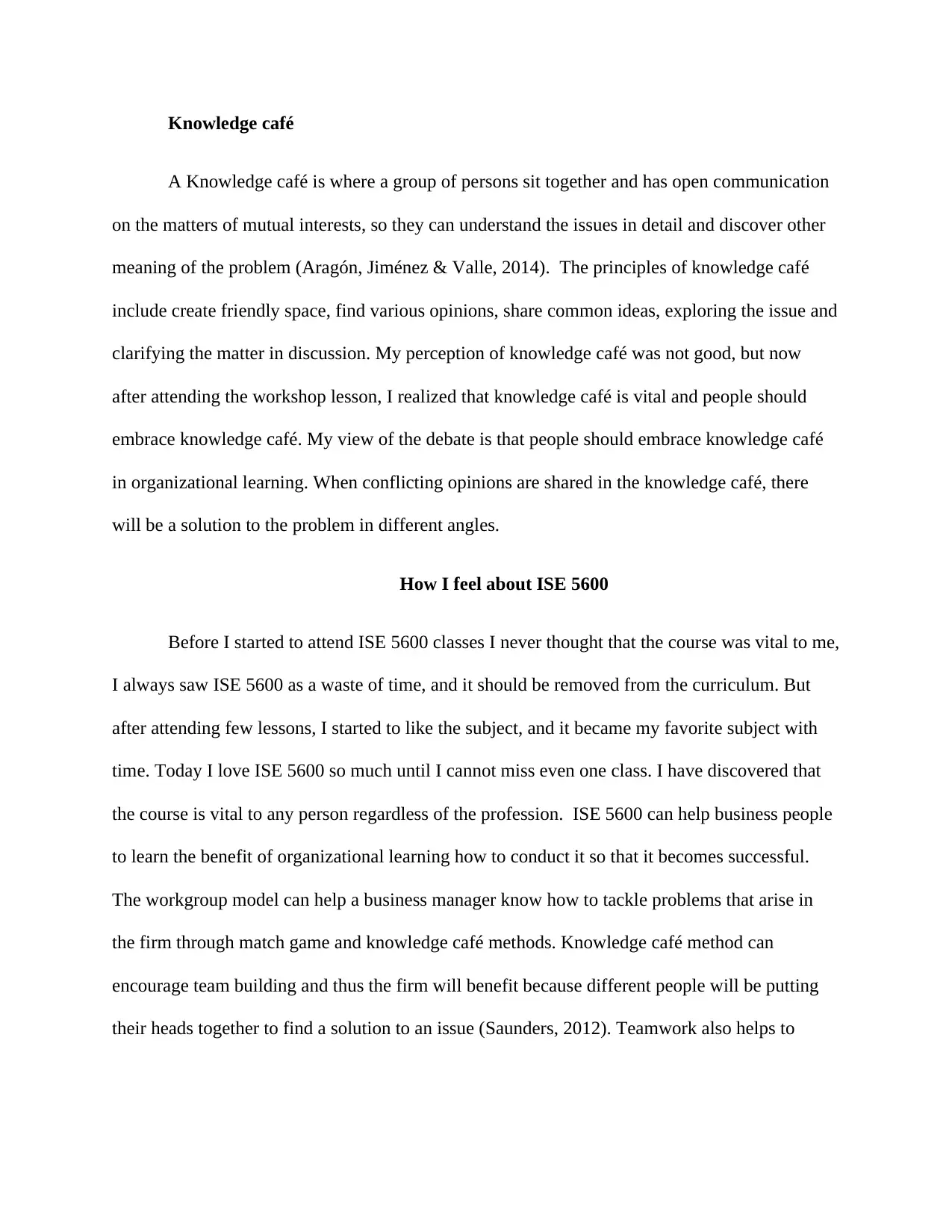
Knowledge café
A Knowledge café is where a group of persons sit together and has open communication
on the matters of mutual interests, so they can understand the issues in detail and discover other
meaning of the problem (Aragón, Jiménez & Valle, 2014). The principles of knowledge café
include create friendly space, find various opinions, share common ideas, exploring the issue and
clarifying the matter in discussion. My perception of knowledge café was not good, but now
after attending the workshop lesson, I realized that knowledge café is vital and people should
embrace knowledge café. My view of the debate is that people should embrace knowledge café
in organizational learning. When conflicting opinions are shared in the knowledge café, there
will be a solution to the problem in different angles.
How I feel about ISE 5600
Before I started to attend ISE 5600 classes I never thought that the course was vital to me,
I always saw ISE 5600 as a waste of time, and it should be removed from the curriculum. But
after attending few lessons, I started to like the subject, and it became my favorite subject with
time. Today I love ISE 5600 so much until I cannot miss even one class. I have discovered that
the course is vital to any person regardless of the profession. ISE 5600 can help business people
to learn the benefit of organizational learning how to conduct it so that it becomes successful.
The workgroup model can help a business manager know how to tackle problems that arise in
the firm through match game and knowledge café methods. Knowledge café method can
encourage team building and thus the firm will benefit because different people will be putting
their heads together to find a solution to an issue (Saunders, 2012). Teamwork also helps to
A Knowledge café is where a group of persons sit together and has open communication
on the matters of mutual interests, so they can understand the issues in detail and discover other
meaning of the problem (Aragón, Jiménez & Valle, 2014). The principles of knowledge café
include create friendly space, find various opinions, share common ideas, exploring the issue and
clarifying the matter in discussion. My perception of knowledge café was not good, but now
after attending the workshop lesson, I realized that knowledge café is vital and people should
embrace knowledge café. My view of the debate is that people should embrace knowledge café
in organizational learning. When conflicting opinions are shared in the knowledge café, there
will be a solution to the problem in different angles.
How I feel about ISE 5600
Before I started to attend ISE 5600 classes I never thought that the course was vital to me,
I always saw ISE 5600 as a waste of time, and it should be removed from the curriculum. But
after attending few lessons, I started to like the subject, and it became my favorite subject with
time. Today I love ISE 5600 so much until I cannot miss even one class. I have discovered that
the course is vital to any person regardless of the profession. ISE 5600 can help business people
to learn the benefit of organizational learning how to conduct it so that it becomes successful.
The workgroup model can help a business manager know how to tackle problems that arise in
the firm through match game and knowledge café methods. Knowledge café method can
encourage team building and thus the firm will benefit because different people will be putting
their heads together to find a solution to an issue (Saunders, 2012). Teamwork also helps to
⊘ This is a preview!⊘
Do you want full access?
Subscribe today to unlock all pages.

Trusted by 1+ million students worldwide
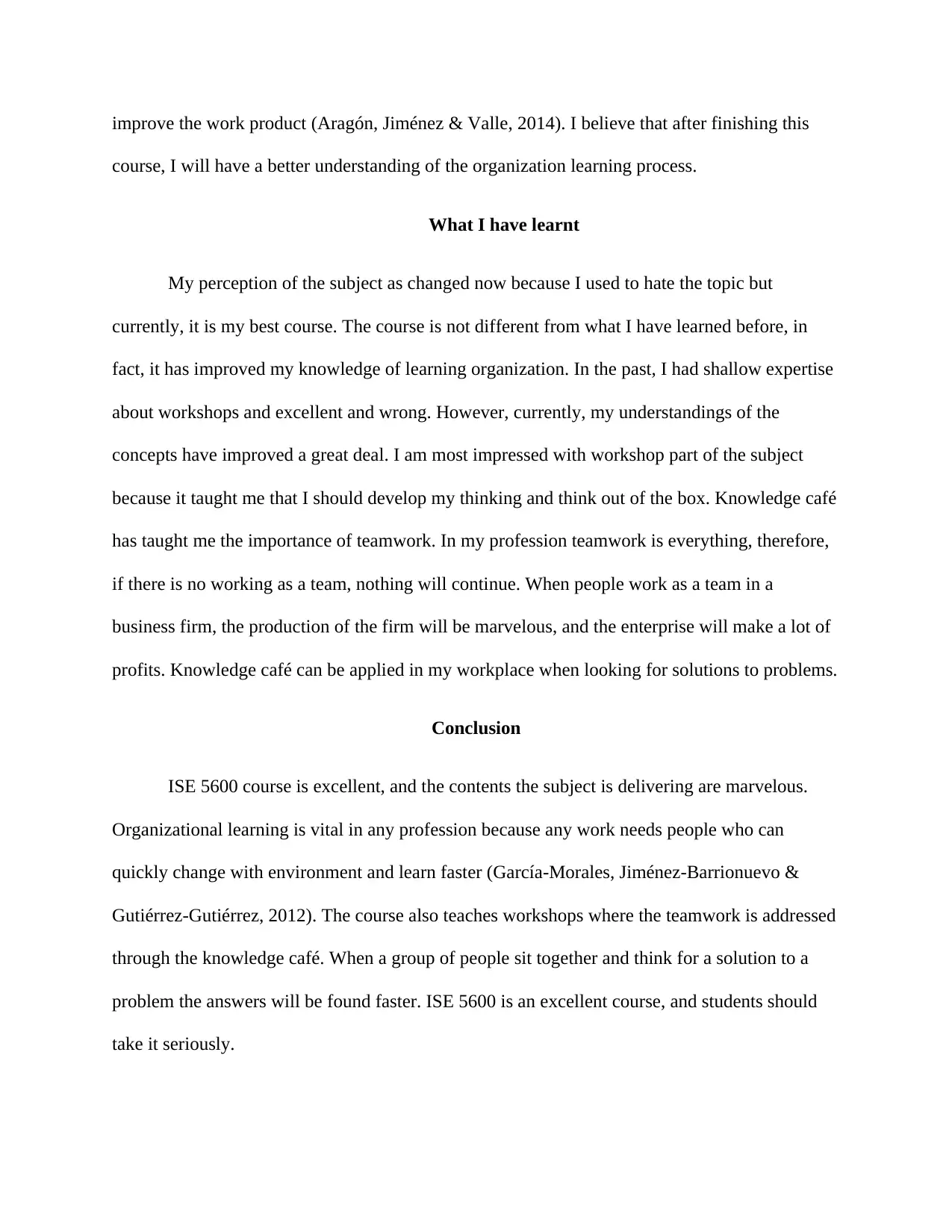
improve the work product (Aragón, Jiménez & Valle, 2014). I believe that after finishing this
course, I will have a better understanding of the organization learning process.
What I have learnt
My perception of the subject as changed now because I used to hate the topic but
currently, it is my best course. The course is not different from what I have learned before, in
fact, it has improved my knowledge of learning organization. In the past, I had shallow expertise
about workshops and excellent and wrong. However, currently, my understandings of the
concepts have improved a great deal. I am most impressed with workshop part of the subject
because it taught me that I should develop my thinking and think out of the box. Knowledge café
has taught me the importance of teamwork. In my profession teamwork is everything, therefore,
if there is no working as a team, nothing will continue. When people work as a team in a
business firm, the production of the firm will be marvelous, and the enterprise will make a lot of
profits. Knowledge café can be applied in my workplace when looking for solutions to problems.
Conclusion
ISE 5600 course is excellent, and the contents the subject is delivering are marvelous.
Organizational learning is vital in any profession because any work needs people who can
quickly change with environment and learn faster (García-Morales, Jiménez-Barrionuevo &
Gutiérrez-Gutiérrez, 2012). The course also teaches workshops where the teamwork is addressed
through the knowledge café. When a group of people sit together and think for a solution to a
problem the answers will be found faster. ISE 5600 is an excellent course, and students should
take it seriously.
course, I will have a better understanding of the organization learning process.
What I have learnt
My perception of the subject as changed now because I used to hate the topic but
currently, it is my best course. The course is not different from what I have learned before, in
fact, it has improved my knowledge of learning organization. In the past, I had shallow expertise
about workshops and excellent and wrong. However, currently, my understandings of the
concepts have improved a great deal. I am most impressed with workshop part of the subject
because it taught me that I should develop my thinking and think out of the box. Knowledge café
has taught me the importance of teamwork. In my profession teamwork is everything, therefore,
if there is no working as a team, nothing will continue. When people work as a team in a
business firm, the production of the firm will be marvelous, and the enterprise will make a lot of
profits. Knowledge café can be applied in my workplace when looking for solutions to problems.
Conclusion
ISE 5600 course is excellent, and the contents the subject is delivering are marvelous.
Organizational learning is vital in any profession because any work needs people who can
quickly change with environment and learn faster (García-Morales, Jiménez-Barrionuevo &
Gutiérrez-Gutiérrez, 2012). The course also teaches workshops where the teamwork is addressed
through the knowledge café. When a group of people sit together and think for a solution to a
problem the answers will be found faster. ISE 5600 is an excellent course, and students should
take it seriously.
Paraphrase This Document
Need a fresh take? Get an instant paraphrase of this document with our AI Paraphraser
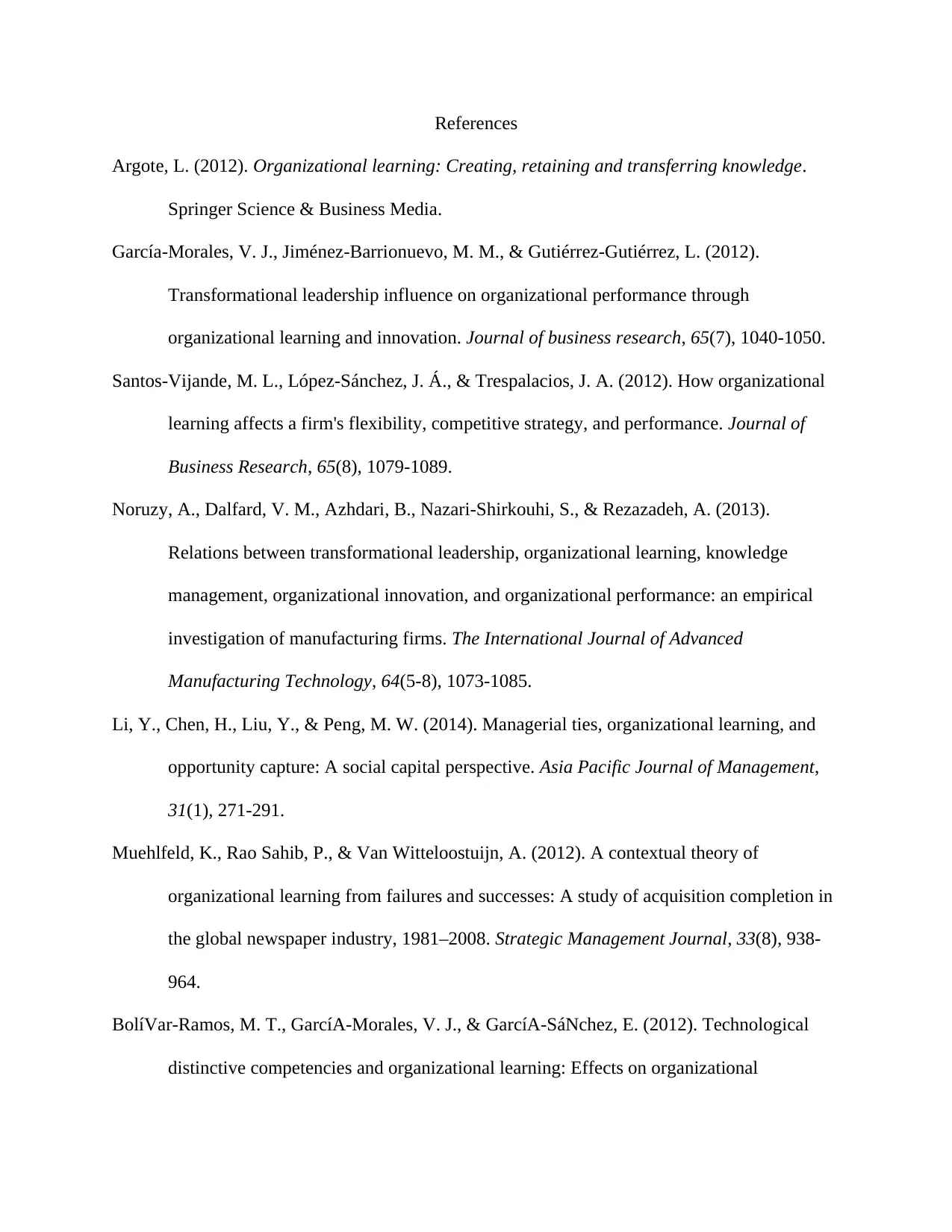
References
Argote, L. (2012). Organizational learning: Creating, retaining and transferring knowledge.
Springer Science & Business Media.
García-Morales, V. J., Jiménez-Barrionuevo, M. M., & Gutiérrez-Gutiérrez, L. (2012).
Transformational leadership influence on organizational performance through
organizational learning and innovation. Journal of business research, 65(7), 1040-1050.
Santos-Vijande, M. L., López-Sánchez, J. Á., & Trespalacios, J. A. (2012). How organizational
learning affects a firm's flexibility, competitive strategy, and performance. Journal of
Business Research, 65(8), 1079-1089.
Noruzy, A., Dalfard, V. M., Azhdari, B., Nazari-Shirkouhi, S., & Rezazadeh, A. (2013).
Relations between transformational leadership, organizational learning, knowledge
management, organizational innovation, and organizational performance: an empirical
investigation of manufacturing firms. The International Journal of Advanced
Manufacturing Technology, 64(5-8), 1073-1085.
Li, Y., Chen, H., Liu, Y., & Peng, M. W. (2014). Managerial ties, organizational learning, and
opportunity capture: A social capital perspective. Asia Pacific Journal of Management,
31(1), 271-291.
Muehlfeld, K., Rao Sahib, P., & Van Witteloostuijn, A. (2012). A contextual theory of
organizational learning from failures and successes: A study of acquisition completion in
the global newspaper industry, 1981–2008. Strategic Management Journal, 33(8), 938-
964.
BolíVar-Ramos, M. T., GarcíA-Morales, V. J., & GarcíA-SáNchez, E. (2012). Technological
distinctive competencies and organizational learning: Effects on organizational
Argote, L. (2012). Organizational learning: Creating, retaining and transferring knowledge.
Springer Science & Business Media.
García-Morales, V. J., Jiménez-Barrionuevo, M. M., & Gutiérrez-Gutiérrez, L. (2012).
Transformational leadership influence on organizational performance through
organizational learning and innovation. Journal of business research, 65(7), 1040-1050.
Santos-Vijande, M. L., López-Sánchez, J. Á., & Trespalacios, J. A. (2012). How organizational
learning affects a firm's flexibility, competitive strategy, and performance. Journal of
Business Research, 65(8), 1079-1089.
Noruzy, A., Dalfard, V. M., Azhdari, B., Nazari-Shirkouhi, S., & Rezazadeh, A. (2013).
Relations between transformational leadership, organizational learning, knowledge
management, organizational innovation, and organizational performance: an empirical
investigation of manufacturing firms. The International Journal of Advanced
Manufacturing Technology, 64(5-8), 1073-1085.
Li, Y., Chen, H., Liu, Y., & Peng, M. W. (2014). Managerial ties, organizational learning, and
opportunity capture: A social capital perspective. Asia Pacific Journal of Management,
31(1), 271-291.
Muehlfeld, K., Rao Sahib, P., & Van Witteloostuijn, A. (2012). A contextual theory of
organizational learning from failures and successes: A study of acquisition completion in
the global newspaper industry, 1981–2008. Strategic Management Journal, 33(8), 938-
964.
BolíVar-Ramos, M. T., GarcíA-Morales, V. J., & GarcíA-SáNchez, E. (2012). Technological
distinctive competencies and organizational learning: Effects on organizational
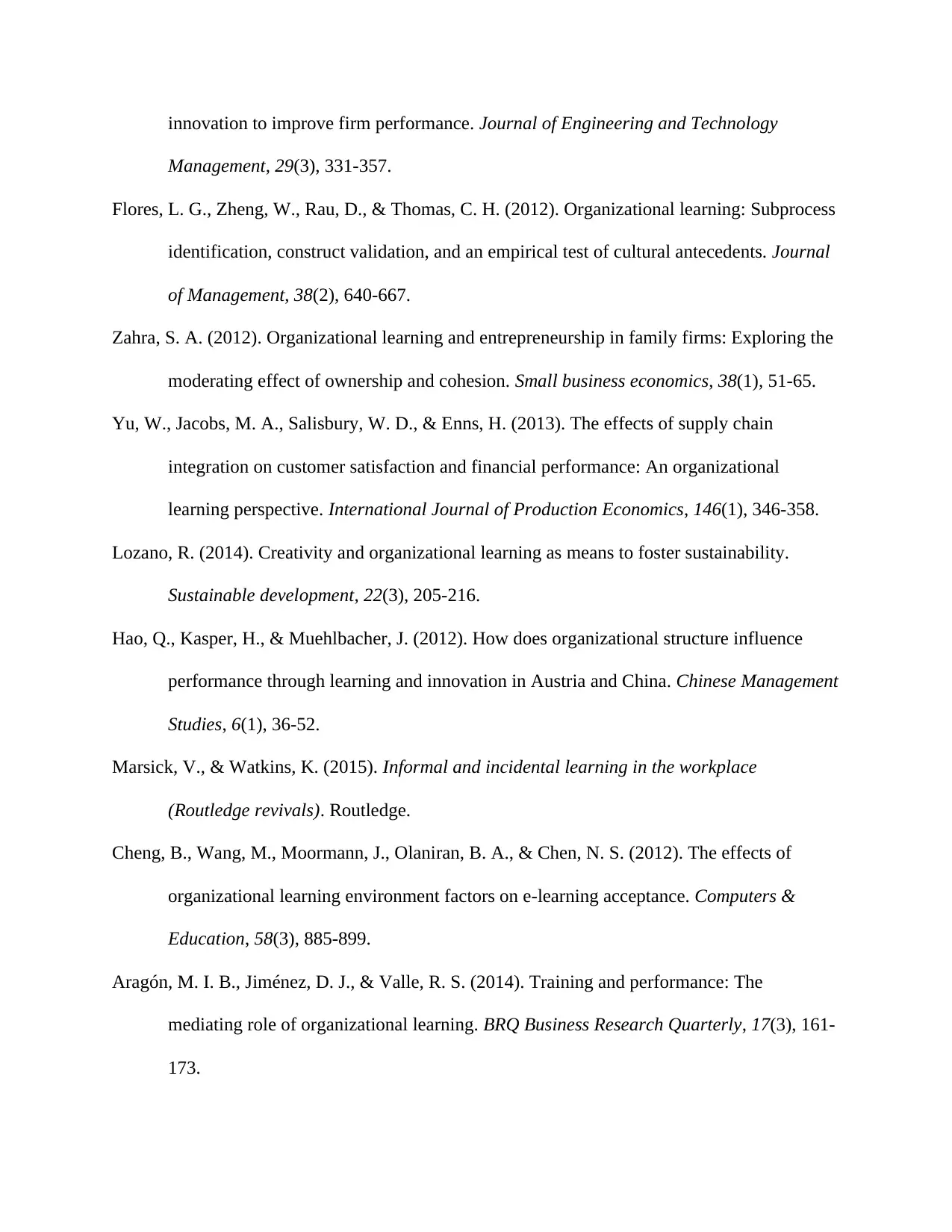
innovation to improve firm performance. Journal of Engineering and Technology
Management, 29(3), 331-357.
Flores, L. G., Zheng, W., Rau, D., & Thomas, C. H. (2012). Organizational learning: Subprocess
identification, construct validation, and an empirical test of cultural antecedents. Journal
of Management, 38(2), 640-667.
Zahra, S. A. (2012). Organizational learning and entrepreneurship in family firms: Exploring the
moderating effect of ownership and cohesion. Small business economics, 38(1), 51-65.
Yu, W., Jacobs, M. A., Salisbury, W. D., & Enns, H. (2013). The effects of supply chain
integration on customer satisfaction and financial performance: An organizational
learning perspective. International Journal of Production Economics, 146(1), 346-358.
Lozano, R. (2014). Creativity and organizational learning as means to foster sustainability.
Sustainable development, 22(3), 205-216.
Hao, Q., Kasper, H., & Muehlbacher, J. (2012). How does organizational structure influence
performance through learning and innovation in Austria and China. Chinese Management
Studies, 6(1), 36-52.
Marsick, V., & Watkins, K. (2015). Informal and incidental learning in the workplace
(Routledge revivals). Routledge.
Cheng, B., Wang, M., Moormann, J., Olaniran, B. A., & Chen, N. S. (2012). The effects of
organizational learning environment factors on e-learning acceptance. Computers &
Education, 58(3), 885-899.
Aragón, M. I. B., Jiménez, D. J., & Valle, R. S. (2014). Training and performance: The
mediating role of organizational learning. BRQ Business Research Quarterly, 17(3), 161-
173.
Management, 29(3), 331-357.
Flores, L. G., Zheng, W., Rau, D., & Thomas, C. H. (2012). Organizational learning: Subprocess
identification, construct validation, and an empirical test of cultural antecedents. Journal
of Management, 38(2), 640-667.
Zahra, S. A. (2012). Organizational learning and entrepreneurship in family firms: Exploring the
moderating effect of ownership and cohesion. Small business economics, 38(1), 51-65.
Yu, W., Jacobs, M. A., Salisbury, W. D., & Enns, H. (2013). The effects of supply chain
integration on customer satisfaction and financial performance: An organizational
learning perspective. International Journal of Production Economics, 146(1), 346-358.
Lozano, R. (2014). Creativity and organizational learning as means to foster sustainability.
Sustainable development, 22(3), 205-216.
Hao, Q., Kasper, H., & Muehlbacher, J. (2012). How does organizational structure influence
performance through learning and innovation in Austria and China. Chinese Management
Studies, 6(1), 36-52.
Marsick, V., & Watkins, K. (2015). Informal and incidental learning in the workplace
(Routledge revivals). Routledge.
Cheng, B., Wang, M., Moormann, J., Olaniran, B. A., & Chen, N. S. (2012). The effects of
organizational learning environment factors on e-learning acceptance. Computers &
Education, 58(3), 885-899.
Aragón, M. I. B., Jiménez, D. J., & Valle, R. S. (2014). Training and performance: The
mediating role of organizational learning. BRQ Business Research Quarterly, 17(3), 161-
173.
⊘ This is a preview!⊘
Do you want full access?
Subscribe today to unlock all pages.

Trusted by 1+ million students worldwide
1 out of 13
Your All-in-One AI-Powered Toolkit for Academic Success.
+13062052269
info@desklib.com
Available 24*7 on WhatsApp / Email
![[object Object]](/_next/static/media/star-bottom.7253800d.svg)
Unlock your academic potential
Copyright © 2020–2025 A2Z Services. All Rights Reserved. Developed and managed by ZUCOL.